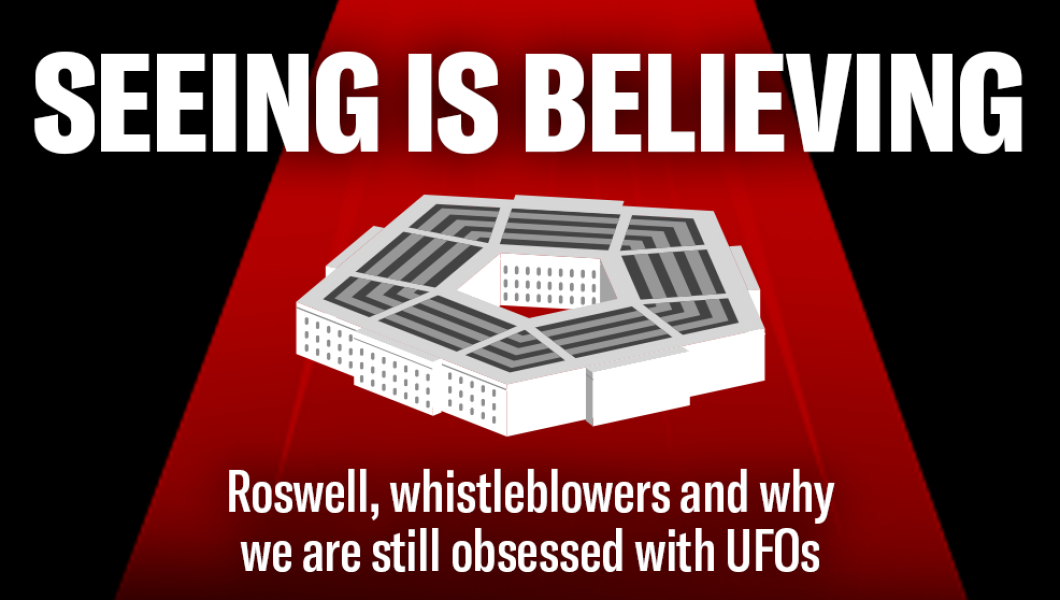Why the UFO whistleblowers are getting a mixed reaction
David Grusch, a retired career intelligence officer, continues to generate attention with his claims that a secret UFO recovery program has operated beyond congressional oversight for decades. Grusch is receiving a mixed reception on and off Capitol Hill.
Still, the Senate Intelligence Committee‘s vice chairman, Sen. Marco Rubio (R-FL), appears to think Grusch might be on to something.
NEITHER THE US NOR ISRAEL IS SERVED BY BIDEN AND NETANYAHU BEING BAD ALLIES
Speaking to NewsNation last week, Rubio noted that other whistleblowers have come forward to the committee to make similar claims of a concealed UFO recovery program. While Rubio said the committee was investigating these claims, it had to be careful. As he put it, “Some of these people still work in the government, and frankly a lot of them are very fearful. Fearful of their jobs, fearful of their clearances, fearful of their career. And some, frankly, are fearful of harm coming to them.”
Rubio, who has an enduring interest in UFOs, is a member of the so-called Gang of Eight group of congressional leaders who are briefed on some of the most classified U.S. intelligence and military activities. Yet not all of the Gang of Eight agree with Rubio’s stance. House Intelligence Committee Chairman Mike Turner (R-OH), for example, recently expressed skepticism about Grusch’s claims. Turner’s comments suggest Congress does not yet possess any smoking gun UFO evidence. This is not to say that such evidence does not exist, but rather that it has been very well hidden within very small groups of people if it does exist.

Top line: Even those UFO incidents, such as the purported July 1947 Roswell crash, which involve credible witness statements and indications of a possible cover-up, will lack widespread credibility if and until physical evidence is unveiled. As an extension, many in the U.S. military and intelligence community who would have a prospective “need to know” about any UFO programs do not know about them.
Take Deputy Director of Naval Intelligence Scott Bray, for example. Bray was criticized by some UFO researchers for supposedly failing to be forthcoming during a UFO briefing to Congress in May 2022. This criticism may or may not be justified. Still, Bray is extremely well-regarded in the U.S. intelligence community, especially for his work on China issues. Rather than being disingenuous, his testimony likely reflected his absent interest in the UFO topic, associated historical reports, and their coalescence with convoluted but compelling imagery and sensor data sets. More importantly, Bray is very likely deeply involved in highly classified programs to recover foreign military technology such as drones, satellites, missiles, and hypersonic vehicles. Many in the intelligence community believe that UFO reports simply involve these terrestrially explained objects.
CLICK HERE TO READ MORE FROM THE WASHINGTON EXAMINER
There’s also a psychological element in play here. Why do many reject the very high likelihood that a very small percentage of UFOs are actually the product of a nonhuman intelligence?
Well, because the stigma surrounding UFOs doesn’t just exist in the media. It extends across the government and the military. Consider that most intelligence officers, military aircrews, and submariners are focused on very obvious threats from nations such as China and Russia. Those threats demand dedicated training and preparation. The intersection of these demands with government bureaucracy and UFO stigma thus disincentivizes the discussion of UFOs. And every time that a flare is misidentified as an alien spacecraft, something which happens too often, the stigma around the topic only grows.
In turn, until Congress or some other authority produces exotic materials, vehicles, or other evidence of truly extraordinary UFOs, individuals like Grusch will continue to meet a mixed reaction.
This article has been archived for your research. The original version from Washington Examiner can be found here.


